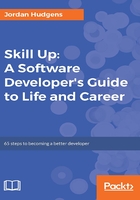
Why we love the prodigy myth
Before I end this chapter, I want to address a subtle issue that explains the reason of why we, as humans, love the idea of prodigies.
The concept of prodigies, individuals born with a natural ability to be successful at a certain skill, such as sports, math, or programming, can be detrimental to our own success. This belief is dangerous because it causes our minds to have negative responses to failure.
For example, if you're an aspiring developer who thinks that programmers are born and not made, when you come across a bug that you can't seem to figure out or a feature you can't build, your first reaction might be:
I guess I wasn't born to do be a developer.
Or:
I wish I had talent like XYZ programmer, everything seems to come so easy to him.
If you catch yourself with thoughts like these, remind yourself that prodigies aren't real.
Developers achieve greatness through smart work and perseverance. The 10,000-hour rule from the Tipping Point book by Malcolm Gladwell may not be exactly accurate. However, it does give a general guide for how much work is required to reach a level of mastery.
If you feel like you weren't born with the "developer gene", go and knock out 10,000 hours of focused practice on building applications. I think you'll be pleasantly surprised to find that you'll become so good, that other people will look at you, and they'll think… that you were just born this way.